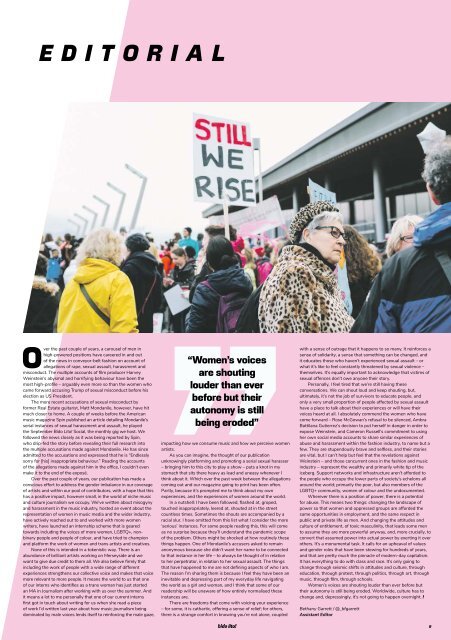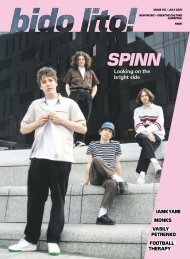Issue 83 / November 2017
November 2017 issue of Bido Lito! magazine. Featuring: SILENT BILL, SECRET SOCIETY OF SUPERVILLIAN ARTISTS, XAMVOLO, REMÉE, MERSEYRAIL SOUND STATION, HOWIE PAYNE, LOYLE CARNER, LIVERPOOL PSYCH FEST, ZOLA JESUS and much more.
November 2017 issue of Bido Lito! magazine. Featuring: SILENT BILL, SECRET SOCIETY OF SUPERVILLIAN ARTISTS, XAMVOLO, REMÉE, MERSEYRAIL SOUND STATION, HOWIE PAYNE, LOYLE CARNER, LIVERPOOL PSYCH FEST, ZOLA JESUS and much more.
Create successful ePaper yourself
Turn your PDF publications into a flip-book with our unique Google optimized e-Paper software.
EDITORIAL<br />
Over the past couple of years, a carousel of men in<br />
high-powered positions have careered in and out<br />
of the news in conveyor-belt fashion on account of<br />
allegations of rape, sexual assault, harassment and<br />
misconduct. The multiple accounts of film producer Harvey<br />
Weinstein’s abysmal and horrifying behaviour have been the<br />
most high-profile – arguably even more so than the women who<br />
came forward accusing Trump of sexual misconduct before his<br />
election as US President.<br />
The more recent accusations of sexual misconduct by<br />
former Real Estate guitarist, Matt Mondanile, however, have hit<br />
much closer to home. A couple of weeks before the American<br />
music magazine Spin published an article detailing Mondanile’s<br />
serial instances of sexual harassment and assault, he played<br />
the September Bido Lito! Social, the monthly gig we host. We<br />
followed the news closely as it was being reported by Spin,<br />
who drip-fed the story before revealing their full research into<br />
the multiple accusations made against Mondanile. He has since<br />
admitted to the accusations and expressed that he is “Endlessly<br />
sorry for [his] inappropriate behaviour.” Reading the accounts<br />
of the allegations made against him in the office, I couldn’t even<br />
make it to the end of the exposé.<br />
Over the past couple of years, our publication has made a<br />
conscious effort to address the gender imbalance in our coverage<br />
of artists and within our pool of contributors, with a hope that this<br />
has a positive impact, however small, in the world of niche music<br />
and culture journalism we occupy. We’ve written about misogyny<br />
and harassment in the music industry, hosted an event about the<br />
representation of women in music media and the wider industry,<br />
have actively reached out to and worked with more women<br />
writers, have launched an internship scheme that is geared<br />
towards including the voices of more women, LGBTQ+, nonbinary<br />
people and people of colour, and have tried to champion<br />
and platform the work of women and trans artists and creatives.<br />
None of this is intended in a tokenistic way. There is an<br />
abundance of brilliant artists working on Merseyside and we<br />
want to give due credit to them all. We also believe firmly that<br />
including the work of people with a wide range of different<br />
experiences strengthens our collective voice and makes that voice<br />
more relevant to more people. It means the world to us that one<br />
of our interns who identifies as a trans woman has just started<br />
an MA in Journalism after working with us over the summer. And<br />
it means a lot to me personally that one of our current interns<br />
first got in touch about writing for us when she read a piece<br />
of work I’d written last year about how music journalism being<br />
dominated by male voices lends itself to reinforcing the male gaze,<br />
“Women’s voices<br />
are shouting<br />
louder than ever<br />
before but their<br />
autonomy is still<br />
being eroded”<br />
impacting how we consume music and how we perceive women<br />
artists.<br />
As you can imagine, the thought of our publication<br />
unknowingly platforming and promoting a serial sexual harasser<br />
– bringing him to this city to play a show – puts a knot in my<br />
stomach that sits there heavy as lead and uneasy whenever I<br />
think about it. Which over the past week between the allegations<br />
coming out and our magazine going to print has been often.<br />
Partly, because it’s prompted me to think about my own<br />
experiences, and the experiences of women around the world.<br />
In a nutshell: I have been followed, flashed at, groped,<br />
touched inappropriately, leered at, shouted at in the street<br />
countless times. Sometimes the shouts are accompanied by a<br />
racial slur. I have omitted from this list what I consider the more<br />
‘serious’ instances. For some people reading this, this will come<br />
as no surprise because they’ll understand the pandemic scope<br />
of the problem. Others might be shocked at how routinely these<br />
things happen. One of Mondanile’s accusers asked to remain<br />
anonymous because she didn’t want her name to be connected<br />
to that instance in her life – to always be thought of in relation<br />
to her perpetrator, in relation to her sexual assault. The things<br />
that have happened to me are not defining aspects of who I am.<br />
The reason I’m sharing them is because I feel they have been an<br />
inevitable and depressing part of my everyday life navigating<br />
the world as a girl and woman, and I think that some of our<br />
readership will be unaware of how entirely normalised these<br />
instances are.<br />
There are freedoms that come with voicing your experience<br />
– for some, it is cathartic, offering a sense of relief; for others,<br />
there is a strange comfort in knowing you’re not alone, coupled<br />
with a sense of outrage that it happens to so many. It reinforces a<br />
sense of solidarity, a sense that something can be changed, and<br />
it educates those who haven’t experienced sexual assault – or<br />
what it’s like to feel constantly threatened by sexual violence –<br />
themselves. It’s equally important to acknowledge that victims of<br />
sexual offences don’t owe anyone their story.<br />
Personally, I feel tired that we’re still having these<br />
conversations. We can shout loud and keep shouting, but,<br />
ultimately, it’s not the job of survivors to educate people, and<br />
only a very small proportion of people affected by sexual assault<br />
have a place to talk about their experiences or will have their<br />
voices heard at all. I absolutely commend the women who have<br />
come forward – Rose McGowan’s refusal to be silenced, Ambra<br />
Battilana Gutierrez’s decision to put herself in danger in order to<br />
expose Weinstein, and Cameron Russell’s commitment to using<br />
her own social media accounts to share similar experiences of<br />
abuse and harassment within the fashion industry, to name but a<br />
few. They are stupendously brave and selfless, and their stories<br />
are vital, but I can’t help but feel that the revelations against<br />
Weinstein – and those concurrent ones in the fashion and music<br />
industry – represent the wealthy and primarily white tip of the<br />
iceberg. Support networks and infrastructure aren’t afforded to<br />
the people who occupy the lower parts of society’s echelons all<br />
around the world; primarily the poor, but also members of the<br />
LGBTQ+ community, women of colour and the undocumented.<br />
Wherever there is a position of power, there is a potential<br />
for abuse. This means two things: changing the landscape of<br />
power so that women and oppressed groups are afforded the<br />
same opportunities in employment, and the same respect in<br />
public and private life as men. And changing the attitudes and<br />
culture of entitlement, of toxic masculinity, that leads some men<br />
to assume they are more powerful anyway, and, more crucially, to<br />
convert that assumed power into actual power by exerting it over<br />
others. It’s a monumental task. It calls for an upheaval of values<br />
and gender roles that have been stewing for hundreds of years,<br />
and that are pretty much the pinnacle of modern-day capitalism.<br />
It has everything to do with class and race. It’s only going to<br />
change through seismic shifts in attitudes and culture, through<br />
education, through protest, through politics, through art, through<br />
music, through film, through schools.<br />
Women’s voices are shouting louder than ever before but<br />
their autonomy is still being eroded. Worldwide, culture has to<br />
change and, depressingly, it’s not going to happen overnight. !<br />
Bethany Garrett / @_bfgarrett<br />
Assistant Editor<br />
9


















